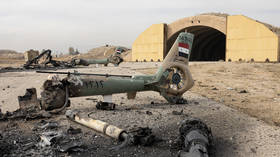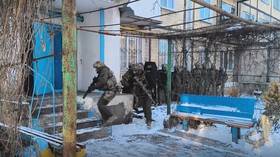Kosovo raises Georgian breakaway republics’ hopes
Tension between Georgia and its breakaway republics rose dramatically in the early 1990s, when Abkhazia and South Ossetia declared independence, though it has never been recognised. But earlier this year the two republic
South Ossetia's own struggle began in 1989. It’s President, Eduard Kokoity, said: “We resulted from the democratic disintegration of the Soviet Union. We took part in referendums and our nation expressed its will. We acted in accordance with international law.”
South Ossetia claims if Kosovo can have independence, then it should too.
Most of its 70,000 strong population are ethnic Ossetians, not Georgians, descended from Asian migrants who settled in the area hundreds of years ago. It only became part of Georgia when the Soviet Union carved up its territory into republics after the 1917 revolution.
“The South Ossetian and Kosovar conflicts both stem from the fall of multinational socialist federations – the Soviet Union and Yugoslavia. That’s one thing they have in common,” political analyst Sergey Romanenko says.
As communism fell, South Ossetia fought a bloody war of independence. Eight years later Kosovo followed suit. Both resulted in a shaky compromise – de facto independence and a joint peacekeeping force for South Ossetia, and UN supervision for Kosovo.
But some argue that culturally, South Ossetia has an even greater right to sovereignty than Kosovo, which is considered by many to be Serbia’s historical heartland.
“The memory of Serbian history is closely connected with Kosovo and with various places in Kosovo, which is so neither in Abkhazia nor in South Ossetia,” political analyst Sergey Arutyunov says.
Like Kosovo, with its mix of different nationalities and faiths, South Ossetia is a checkerboard of ethnic Ossetian and Georgian-inhabited areas.
Civilians of both nationalities came under fire in the war in the early 1990s. But as the world digested February’s events in Kosovo, the Georgian President spoke out for the rights of his people.
Mikhail Saakashvili said: “We will never allow, and the world should never allow, the legalisation of the situation of ethnic cleansing committed in Georgia’s regions under the pretext of Kosovo, because that will be against the fundamental principals on which human rights and international law are based, and against the interests of Georgia and indeed of Russia itself.”
A key player in both battles, Russia has historical ties to both Kosovo and South Ossetia.
In the spring it sent aid to its fellow Slavs, the Serb enclaves in Kosovo, and now Moscow says it’s protecting its own citizens as the majority of South Ossetians now hold Russian passports.
Kosovo undoubtedly raised South Ossetia’s hopes and compounded Georgia’s fears. But South Ossetia's claim for independence is an older struggle, and may have come to a head even without this precedent.
As Pristina claimed sovereignty, Georgia's breakaway regions called for a unified approach in resolving regional struggles for independence.












